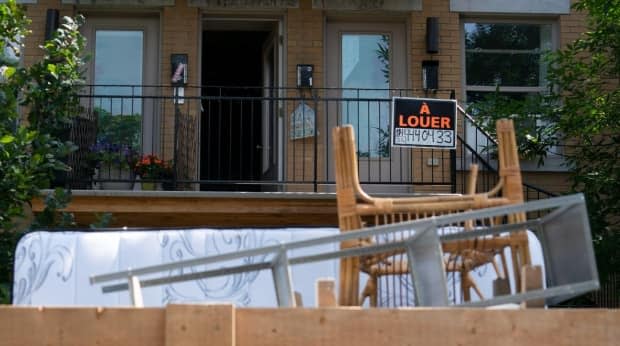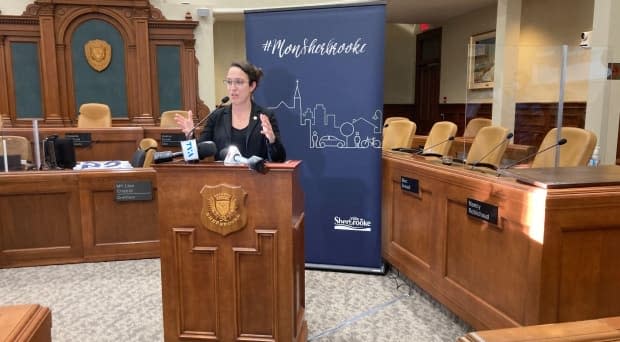Sherbrooke sitting on 100 empty units while housing crisis grows

Sherbrooke housing advocate Gabriel Pallota doesn't mince words when describing the housing situation in his city.
"Close to catastrophic wouldn't be too much of an exaggeration," he said.
The city's vacancy rate is currently below one percent, leaving very few options for those looking for a place to live.
About 40 families are on the waiting list for affordable housing, and another 30 people are waiting for subsidized apartments, according to Pallota.
And yet, some 100 social housing units are sitting empty and unused. They need to be renovated before people can move in but a shortage of workers and construction material is making that challenging.
The repair work needed varies from complete bathroom renovations, to installing new cabinets and painting walls.
Sherbrooke's municipal housing agency says it could take up to two years to complete all the work.
"We're overwhelmed," said Marie-Claude Bégin, the agency's general manager, in an interview with Radio-Canada. "We have six maintenance workers, a caretaking team of 10."
"The workload is really big."
Sherbrooke Mayor Évelyne Beaudin said the city is hoping to make a third of those units ready and available this year to help deal with the crisis.
"We are trying to see if we can provide workers or if we can help with money, but the problem now is that electricians and plumbers are not available," she said.
She said the province should step in by providing more money to help pay for the renovations.
Beaudin could not pinpoint exactly how many social housing units there are in the city but said there are some 46 people on the municipal housing list who need emergency accommodations for June and July.

Crisis to worsen with moving day
The city is expecting the situation to worsen this summer, just like it did after last year's Moving Day, July 1.
Beaudin said the crisis could get worse as early as June because that's when many leases end and when many landlords do repair work.
Sherbrooke's tenants' association estimates that about 130 people will be lacking housing after the dust settles.
That's nearly double the number of people last summer, and four times as many as in 2020, according to Mario Mercier, a spokesperson for the association.
Mercier said the Quebec government is to blame for the situation.
"It's a symptom of the lack of interest of the government to really invest in social housing," he said.
But other factors are also at play, according to Beaudin and Pallota.
Beaudin said part of the problem is that the number of available apartments in Sherbrooke is at an all-time low.
The increase in rent, the higher cost of living and the return of people who no longer work from home to the city all play a role, according to Pallota.
Residents to be charged for emergency assistance
While the city does have an emergency assistance program for residents without housing, it has recently announced that it will start charging for it.
Residents will have to shell out the equivalent of one month's rent in order to get temporary accommodations.

Beaudin said the fee was necessary to help finance several services the city is putting in place ahead of Moving Day.
Some of the initiatives include helping residents with moving, storage, meals, apartment visits and even taking care of pets.
But Beaudin said the city can't pay for those services on its own.
"Last year, the moving crisis cost $462,000 [but] the help received from Quebec was only $136,000," she said. "It's not enough."
The city also wants to keep its citizens accountable by imposing that fee, Beaudin said.
She said after speaking with social workers on the ground, the city councillors concluded there should be a form of financial commitment from those in need of housing to keep them involved and active in the situation.

Mercier argues it is unfair to demand that people who are struggling financially pay a fee for emergency services.
"[Housing] should be a right, not a commodity," he said. "We think we should be building more subsidized housing to make sure everyone has a roof."
Mercier said the province should provide more funding to help with the maintenance of the empty units.
In an email to Radio-Canada, a spokesperson for Quebec's minister of municipal affairs and housing, Andrée Laforest, said Sherbrooke's housing agency had received $10 million to do the renovations and that it was up to it to plan accordingly.
Last week, the Quebec government announced a $77-million investment to help low-income families who live in privately owned housing pay their rent.
These families will be able to receive up to 25 per cent of their household income in subsidies.

 Yahoo Movies
Yahoo Movies 
